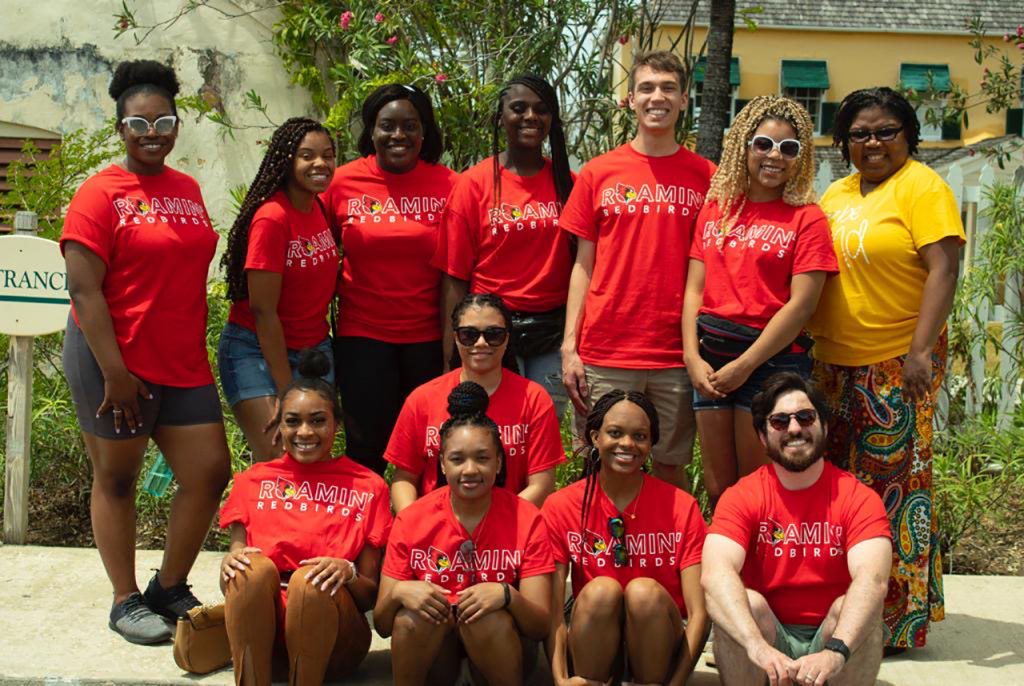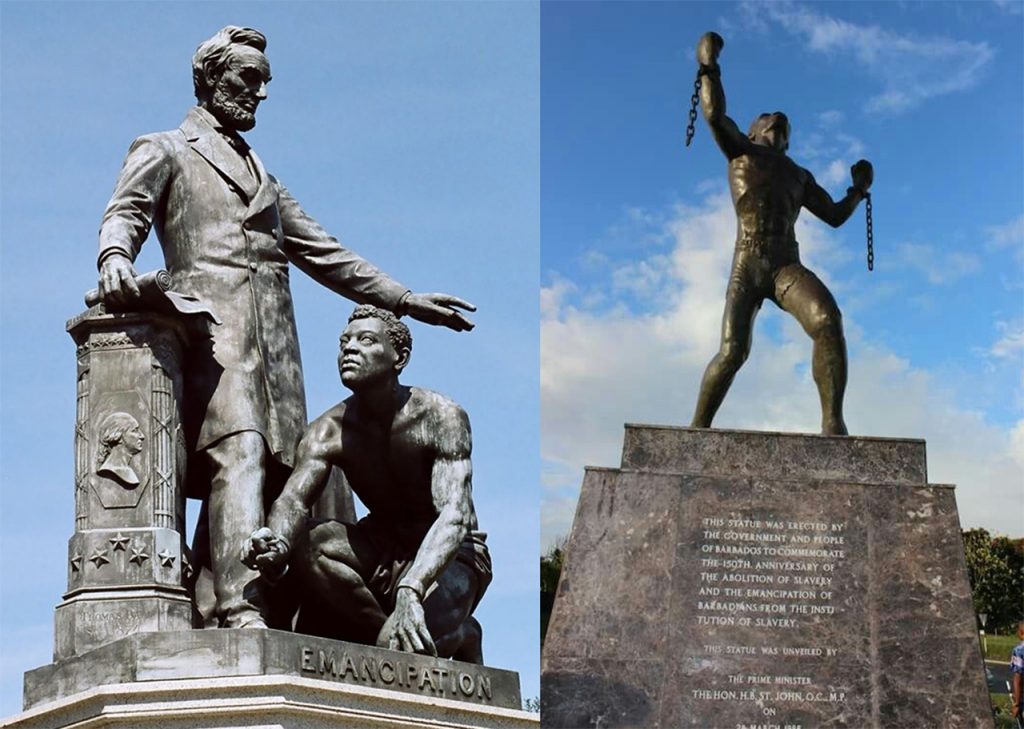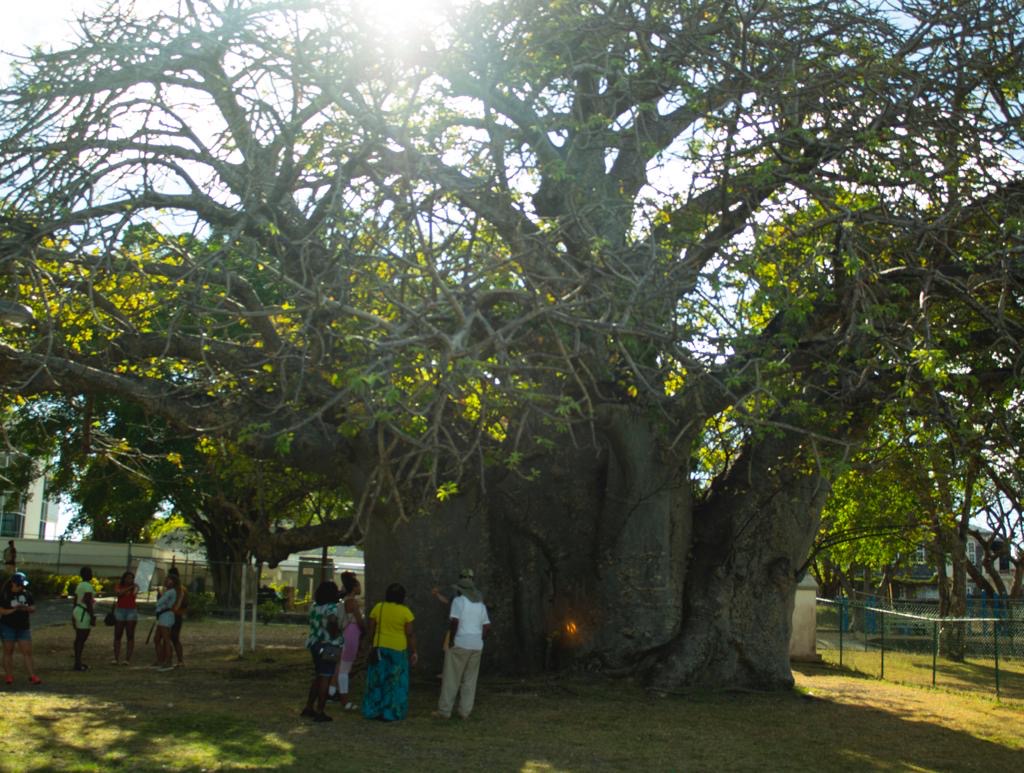Earlier this year, and prior to global travel restrictions, 10 Illinois State University students journeyed to Barbados and gained a glimpse of a society that has pushed past many of the barriers facing the United States.
Students were taking Management and Quantitative Methods 120: Diversity, Inclusion and Equity in the Workplace with Dr. Tina Thompson as a social science credit, which was part of a new program “Multicultural Reflection and Engagement in Barbados.” The study aboard program also includes an opportunity to take History 285: Environment and History in Barbados with Dr. Keith Pluymers as a history humanities credit. The goal of the MQM course was to compare–and–contrast approaches to diversity in the workplace between the United States and the small, island commonwealth of Barbados, which lies in the Caribbean. What students gained went beyond the business world.

Dr. Tina Thompson (far right, standing) and Dr. Keith Pluymers (far right, seated) led students on a course comparing aspects of business and society in the United States to Barbados. Students posed in front of George Washington’s house in Barbados. Photo by Gabby Thompson.
Nine of the students traveling with Thompson were African American women. “About 95 percent of the population of Barbados is of Afro–Caribbean descent,” said Thompson. “So this group went from being in the minoritized group in the U.S. to being part of the majority. The 10th student, a white male, experienced what it was like to belong to the underrepresented group.”
Students documented an instant reaction. “The women talked about feeling more welcome, more at ease, more confident, more willing to express their opinions. The male student who was well-travelled and culturally competent, found a deep appreciation for Barbados,” said Thompson, who required students to write about the impact of the course. The entries showed that the trip could reverberate in the way students approach their lives as well as their future workplaces. “Several people spoke about how they wanted to carry that feeling with them back home. I would say it was empowering.”
“It was a healing experience because of the number of people who look like me in the population and their social norms.” Genesis Robinson
For teacher education major Genesis Robinson, traveling with Thompson was just as inspiring as the journey. “Seeing a black woman professor in the College of Business present a study abroad program was amazing,” said Robinson, a junior from Chicago who met Thompson during a presentation to TRIO students. Having studied abroad in Spain in 2019, Robinson knew she wanted to repeat the experience. “Before the trip, I learned about the population in Barbados. It was then I knew I wanted to experience that change in demographics. Diversity was truly at the forefront of the learning experience,” she said.
In Barbados, Thompson partnered with retired history professor Trevor Marshall, who led the students on a tour of the Newton Slave Burial Ground, one of the only preserved slave burial sites in the western hemisphere. “It was such a solemn experience for the students,” said Thompson, who was in awe when Dr. Marshall began singing a slave folk song and had the students join in the response. “They were transfixed. Some were crying. It was a powerful experience.”

Two interpretations of emancipation. (Left) the Emancipation Monument in Washington, D.C. shows a formerly enslaved person kneeling at the feet of Abraham Lincoln. (Right) the Bussa Emancipation Monument in Barbados represents a man breaking his chains.
One of the assignments was to compare the Emancipation Statue in Barbados to the Emancipation Memorial in Washington, D.C. While the statue in Barbados portrays a former slave breaking from his chains and standing with arms uplifted, the one in the U.S. capitol shows a former slave kneeling at the feet of President Abraham Lincoln. “The Barbados statue is a celebration—former slaves rising up out of bondage—whereas emancipation in the U.S. is portrayed as a bestowed gift and not a celebration of humanity. The portrayal of these statues has implications for how people from underrepresented groups, especially people of color, are treated within the workplace today.”
The group discussed other differences in society, culture, and business. The island, which has already elected its first female prime minister, does not suffer from a gender wage gap. “They are leaps and bounds ahead in that regard,” said Thompson.
Robinson said she understood why Barbados was chosen as a location for studies. “It is a really pure place. I felt like the landscape and history all play a part in why we went to Barbados specifically,” said Robinson. “It was a healing experience because of the number of people who look like me in the population and their social norms.”
Students also explored the island’s growing farm-to-table industry. “Before leaving, students learned about a local farm-to-table enterprise, Epiphany Farms, and heard a lecture on the cultural impact of food from anthropologist Dr. Gina Hunter,” said Thompson. The students took away an understanding that in the United States, “there is a subset of the population that appreciates eating ‘clean,’ and farm-to-table is recognized as a part of that sustainable movement,” said Thompson. Studying the same movement in Barbados showed a different societal need. “Barbados is incredibly dependent upon imported food,” said Thompson, adding a box of instant blueberry muffin mix can cost upward of $6. “The movement is taking off now to increase independent agriculture production.”
Thompson said she believes the eight-day journey left a lasting impact on students. The overall learning objective for the course was to understand that, more so than any other time in human history, success in every aspect of life depends on understanding and valuing human differences. “Students have shared with me that this was a transformational experience. And it was meant to be,” she said.


